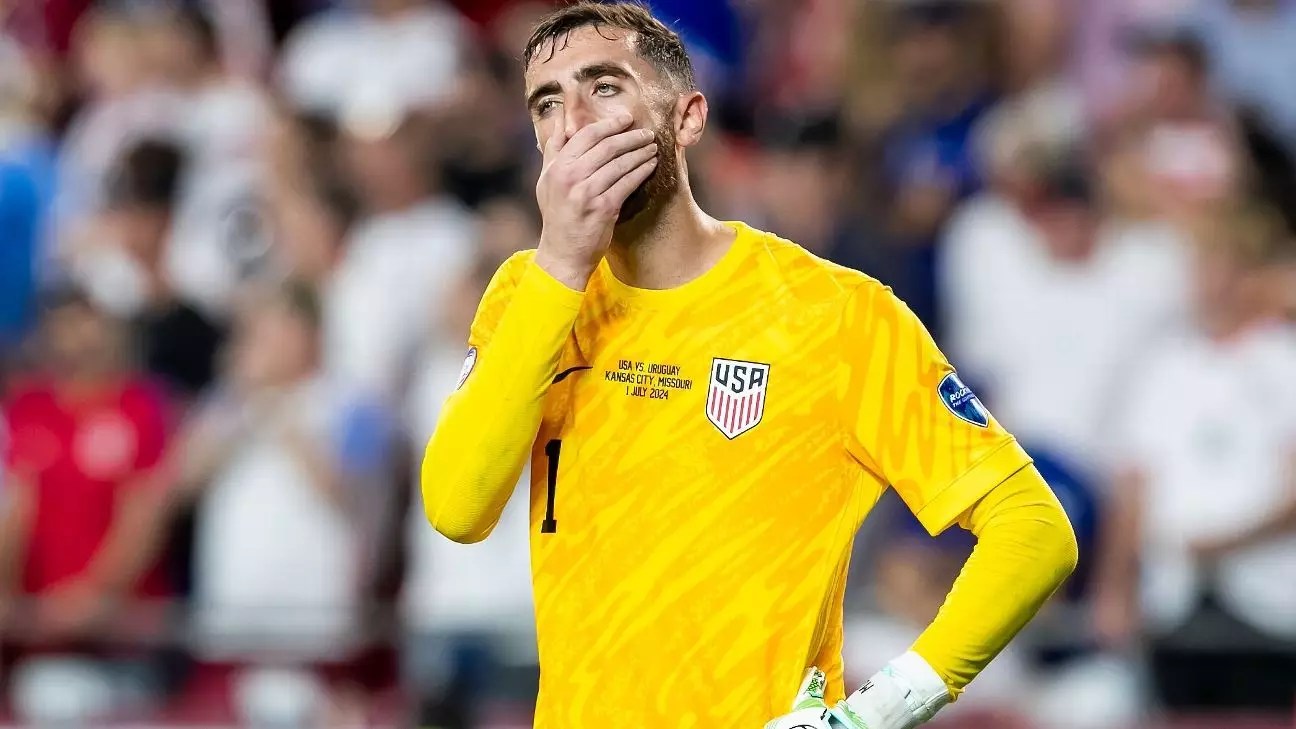Matt Turner’s career narrative defies the typical trajectory of a professional footballer. From his humble beginnings in Park Ridge, New Jersey, to becoming a key figure in the USMNT, his story embodies resilience and relentless pursuit of excellence. Yet, what stands out most is the volatility that has characterized his recent years, highlighting the unpredictable nature of football careers at the highest level. Turner’s journey underscores that talent alone does not guarantee stability; strategic decisions, timing, and a touch of luck play equally crucial roles.
His rise was meteoric—rapid growth through MLS ranks, earning MLS Goalkeeper of the Year in 2021, and earning a move to Arsenal, one of England’s premier clubs. However, this leap to Europe’s top leagues soon encountered hurdles. Limited playing time at Arsenal and Nottingham Forest created a career crossroads, forcing Turner to seek opportunities elsewhere. His loan to Crystal Palace parked him on the bench yet again, exemplifying how even talented players can struggle when circumstances don’t align. This series of setbacks vividly illustrates the harsh reality that consistent game time is often the currency for upward mobility.
The attempted transfer to Lyon was supposed to be a turning point, a chance to stabilize his club career at a top-tier European side. Yet, internal upheavals and financial struggles within Lyon created chaos, causing the deal to stumble just before its completion. This episode underscores how off-field factors—ownership disputes, financial viability, and administrative decisions—can derail even the most promising career moves. Turner’s experience illustrates that in modern football, success depends not only on individual skill but also heavily on the larger structural and organizational stability of clubs.
The Power of Strategic Resilience and Recalibration
Facing diminished playing time and uncertain prospects abroad, Turner’s return to MLS with New England Revolution reflects a calculated strategic move. Rather than languish on the bench, he opts to reclaim his status in familiar territory—a place where he started his professional journey and gained recognition. This decision exemplifies a broader lesson: sometimes, success demands recalibration and an understanding that expedience is less important than sustained growth.
For Turner, this isn’t just a step back, but a leap forward. Securing a loan with the Revolution through June 2026 signals a commitment to restoring his form and confidence. Moreover, the possibility of not counting as a Designated Player for 2026 provides flexibility for the club and the player, emphasizing that strategic planning often involves complex considerations of roster management and future potential.
From a national team perspective, this move could be pivotal. U.S. manager Mauricio Pochettino’s openness about Turner’s need for regular playing time exposes a fundamental truth: consistent competition at the club level directly influences international performance and selection. Turner’s fluctuating fortunes abroad made him a less viable option for the USMNT, illustrating how club stability and personal form are intertwined with international opportunities.
The broader implication here is that resilience in the face of setbacks is a critical trait for professional athletes. Turner’s willingness to adapt—to accept a loan move, to navigate club upheavals—demonstrates that perseverance and strategic agility are essential ingredients for long-term success. His story challenges players and managers alike to view career setbacks not as dead ends but as opportunities to recalibrate and refocus.
The Real Power Play: Leveraging Opportunities in a Complex Football World
Turner’s saga reveals that football is as much about navigating complexities off the pitch as it is about athletic talent. Internal club conflicts, financial struggles, and managerial decisions influence career trajectories in profound ways. His case highlights the importance of timing, adaptability, and the ability to seize opportunities—sometimes those opportunities come unexpectedly or require patience amid chaos.
This scenario also raises questions about the future of player development and the importance of mental resilience. Turner’s willingness to return to MLS—despite the allure of European football—demonstrates an understanding that sustainable growth often requires strategic patience. It is a testament to the fact that the most resilient players are those who recognize the value of situational awareness and leverage available options to position themselves for future success.
Ultimately, Turner’s current situation is more than a career reset; it is a showcase of how strategic thinking, resilience, and a keen grasp of the evolving football landscape can enable a player to turn setbacks into rebound moments. His story is a powerful reminder that setbacks are part of the game, but how one responds determines the trajectory of their career. It challenges the industry to rethink the linear paths to success and embrace a more nuanced understanding of perseverance and adaptability in the modern game.


Leave a Reply